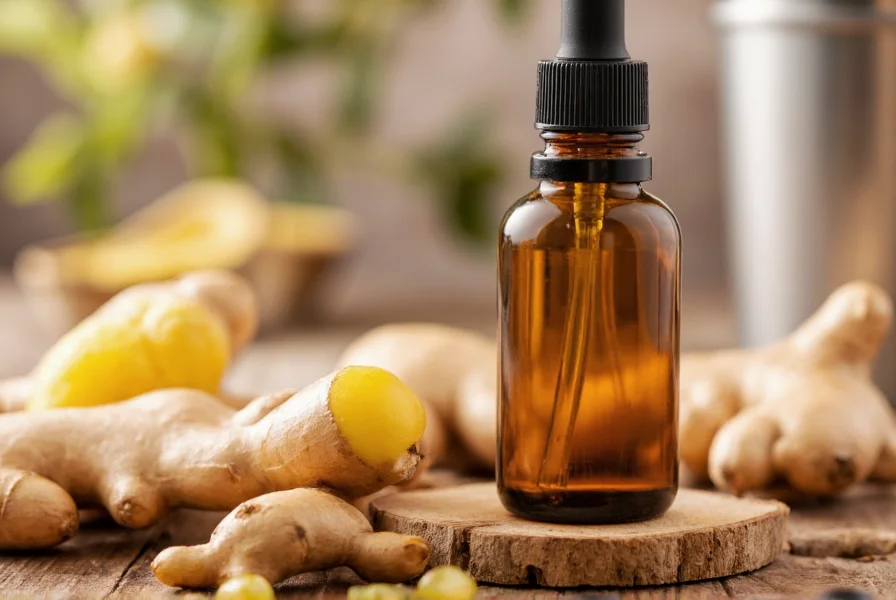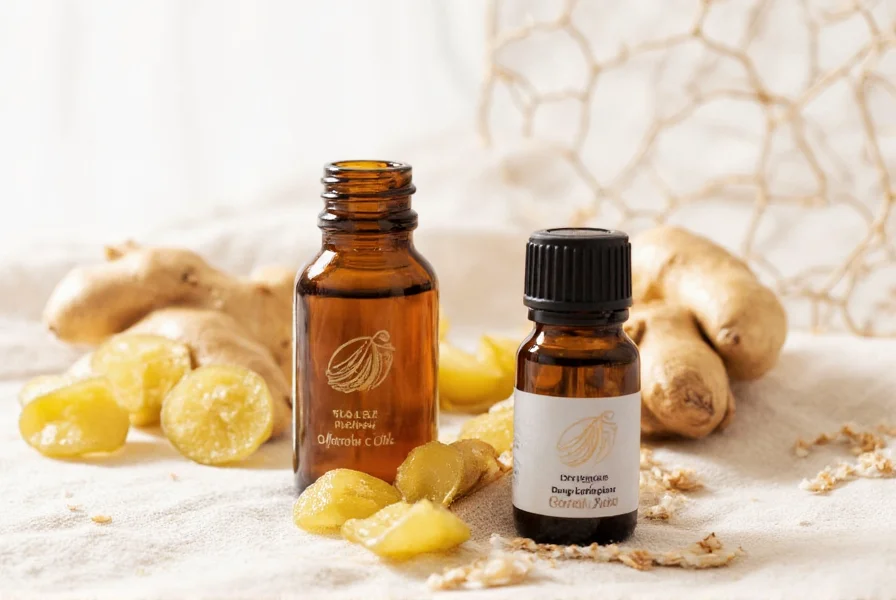Understanding Ginger Essential Oil Composition and Extraction
Ginger essential oil contains bioactive compounds including zingiberene, beta-bisabolene, and gingerols that contribute to its therapeutic properties. The oil extraction process involves steam distillation of fresh or dried ginger rhizomes, yielding approximately 1-3% oil by weight. This concentration means ginger essential oil delivers potent compounds in small quantities compared to ginger powder or fresh root.

Scientifically Supported Benefits of Ginger Essential Oil
Multiple clinical studies validate ginger essential oil's effectiveness for specific applications. A 2020 review in Complementary Therapies in Medicine analyzed 12 trials involving 1,278 participants, confirming ginger's significant impact on reducing nausea severity. The mechanism involves 5-HT3 receptor modulation in the gastrointestinal tract and central nervous system.
Research published in Journal of Alternative and Complementary Medicine demonstrated that inhaling ginger essential oil reduced postoperative nausea by 32% compared to placebo. Another study found that topical application of diluted ginger oil (2% concentration in carrier oil) significantly decreased muscle pain after exercise-induced injury.
Practical Applications and Usage Guidelines
For ginger essential oil for nausea relief, consider these evidence-based methods:
| Application Method | Dilution Ratio | Frequency | Best For |
|---|---|---|---|
| Inhalation (direct) | Undiluted | As needed | Motion sickness, morning nausea |
| Diffuser | 3-5 drops per 100ml water | 15-30 minute intervals | General digestive support |
| Topical (abdomen) | 1-2% in carrier oil | 2-3 times daily | Digestive discomfort, muscle aches |
How to Use Ginger Essential Oil Safely
Proper ginger essential oil dilution ratio is critical for safe application. For adults, a 1-2% dilution (6-12 drops per ounce of carrier oil) is generally safe for topical use. Always perform a patch test 24 hours before widespread application. Never apply undiluted ginger essential oil directly to skin, as it may cause irritation or sensitization.
Safety Considerations and Contraindications
While generally recognized as safe when used appropriately, ginger essential oil safety requires attention to specific conditions:
- Pregnancy considerations: Avoid during first trimester; consult healthcare provider before use in later stages
- Medication interactions: May enhance effects of blood thinners (warfarin) and diabetes medications
- Skin sensitivity: Potential for mild irritation, especially in concentrations above 2%
- Children: Not recommended for children under 6 years old
Individuals with gallstones should consult a physician before using ginger essential oil, as it may stimulate bile production. Those scheduled for surgery should discontinue use at least two weeks preoperatively due to potential blood-thinning effects.
Selecting Quality Ginger Essential Oil
When choosing ginger essential oil for digestion support or other applications, consider these quality indicators:
- Botanical name: Must specify Zingiber officinale on label
- Extraction method: Steam distilled (preferred for therapeutic use)
- GC/MS report: Reputable brands provide gas chromatography reports
- Color: Pale yellow to amber liquid
- Aroma: Warm, spicy, characteristic ginger scent without chemical notes
Research Limitations and Realistic Expectations
While promising, current research on ginger essential oil benefits has limitations. Most studies focus on oral ginger consumption rather than essential oil applications. The concentration of active compounds differs significantly between whole ginger and essential oil.
A 2022 systematic review noted that only 3 of 27 studies examined ginger essential oil specifically, with the remainder studying ginger powder or extracts. This means many purported benefits of ginger essential oil are extrapolated from research on other ginger preparations.
For conditions like chronic pain or serious digestive disorders, ginger essential oil should complement rather than replace conventional medical treatment. It works best as part of an integrative approach to wellness.
Integrating Ginger Essential Oil into Daily Wellness
For ginger essential oil diffuser applications, combine with complementary oils like peppermint for enhanced nausea relief or lavender for stress reduction. A simple blend:
- 2 drops ginger essential oil
- 1 drop peppermint essential oil
- 100ml water in diffuser
For topical use targeting digestive support, massage diluted ginger oil (1% concentration) in clockwise motions around the navel area. This technique, combined with deep breathing, may enhance ginger essential oil for digestion benefits.
Frequently Asked Questions
Can ginger essential oil help with morning sickness?
Research shows ginger essential oil may reduce nausea severity associated with morning sickness when used in a diffuser or properly diluted for topical application. However, pregnant women should consult their healthcare provider before use, especially during the first trimester, and avoid oral consumption of the essential oil.
What's the proper dilution for ginger essential oil on skin?
For safe topical application, use a 1-2% dilution (6-12 drops per ounce of carrier oil like coconut or jojoba). Perform a patch test 24 hours before widespread use. Higher concentrations may cause skin irritation, especially for sensitive skin types.
Is ginger essential oil safe for children?
Ginger essential oil is generally not recommended for children under 6 years old. For older children, use extreme caution with very low dilution (0.25-0.5%) and consult a pediatric healthcare provider first. Never apply near children's faces due to potential respiratory irritation.
How does ginger essential oil compare to ginger supplements?
Ginger essential oil contains concentrated volatile compounds but lacks the full spectrum of gingerols found in whole ginger supplements. Essential oil works primarily through aromatic and topical pathways, while supplements provide systemic effects through digestion. They serve different purposes in wellness routines.











 浙公网安备
33010002000092号
浙公网安备
33010002000092号 浙B2-20120091-4
浙B2-20120091-4